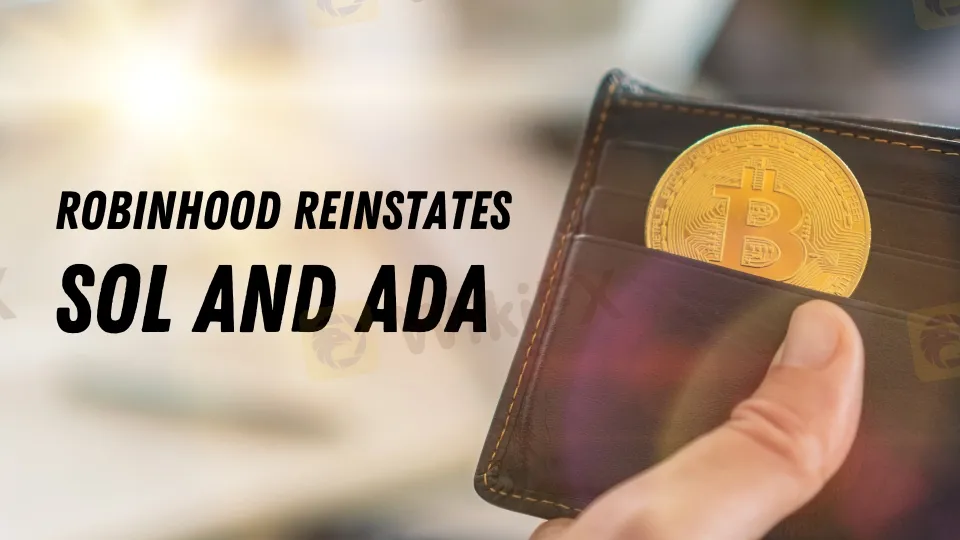简体中文
繁體中文
English
Pусский
日本語
ภาษาไทย
Tiếng Việt
Bahasa Indonesia
Español
हिन्दी
Filippiiniläinen
Français
Deutsch
Português
Türkçe
한국어
العربية
Robinhood Reinstates SOL and ADA Amid Expanding Crypto Offerings
Abstract:Robinhood brings back SOL and ADA for U.S. investors after delisting due to SEC concerns, adding XRP and PEPE in an expanded lineup of 19 cryptocurrencies.

Robinhood has officially expanded its crypto lineup, reinstating Solana (SOL) and Cardano (ADA) after more than a year since they were delisted due to regulatory concerns. The popular trading platform now offers 19 digital assets for US investors, with the latest additions including Solana, Cardano, XRP, and Pepe (PEPE).
The news of these additions stirred the market, with PEPE surging by 65% to reach a high of $0.00002244. The price jump highlights renewed interest in “old memecoin” tokens like Dogecoin (DOGE) and Shiba Inu (SHIB), which have also recently seen increases. DOGE and SHIB rose by 105% and 43% respectively over the past week.
Robinhood originally removed SOL, ADA, and Polygon (POL) in June 2023 following a decision by the US Securities and Exchange Commission (SEC) to label these tokens as unregistered securities. The SECs classification was part of broader enforcement actions against major crypto exchanges, impacting investor access to these assets. In response, Robinhood opted to temporarily remove them from its offerings.

In May, the SEC issued a Wells Notice to Robinhood, signaling an investigation into its cryptocurrency listings, custody practices, and platform operations. Despite Robinhood's efforts to work closely with the regulator, including 16 separate meetings to clarify compliance measures, the SEC continued its scrutiny. Robinhood CEO Vlad Tenev expressed frustration with the SEC's stance, highlighting that the company acted in good faith to ensure regulatory alignment.
The expansion of Robinhood‘s crypto offerings comes amid renewed market optimism following the election of President-elect Donald Trump. Market sources suggest that Trump’s administration might consider appointing Dan Gallagher, Robinhood's Chief Legal Officer and former SEC commissioner, as the new SEC Chair. This potential shift in leadership has sparked hope for a more favorable regulatory environment for crypto firms.
Final Thoughts
Robinhood‘s decision to expand its crypto asset lineup reflects growing investor demand and market optimism. With key tokens like Solana and Cardano back in its offerings, the platform signals its commitment to providing diverse investment options while navigating a complex regulatory landscape. The addition of XRP and PEPE further emphasizes its focus on tapping into the interests of both seasoned investors and the memecoin community. The evolving regulatory stance will continue to shape the industry, but Robinhood’s proactive steps suggest a resilient approach in an ever-changing market.

Disclaimer:
The views in this article only represent the author's personal views, and do not constitute investment advice on this platform. This platform does not guarantee the accuracy, completeness and timeliness of the information in the article, and will not be liable for any loss caused by the use of or reliance on the information in the article.
Read more

Oanda Shines As Frop Trading Firm After Being Acquired By FTMO
FTMO enhances prop trading with the OANDA Prop Trader Community and loyalty program, integrating CRM automation and rewards post-acquisition.

The End of Costly USDT Transfers: Tron Reshapes Stablecoin Transactions
Tether’s USDT stablecoin will soon be available for commission-free transactions on the Tron blockchain, a move poised to redefine stablecoin transfers. The development comes as Tron transaction fees have surged, making the network one of the most expensive for USDT transfers.

Crypto Fraudster Sentenced to 11 Years as China Intensifies Crackdown
China has sentenced a crypto fraudster to 11 years in prison and imposed a CNY 50,000 (approximately $6,900) fine for misrepresenting digital tokens in a fraudulent sale.

PH Senator Probes Love Scams Tied to POGOs
Senator Gatchalian files resolution to investigate love scams and online fraud linked to banned POGOs in the Philippines, targeting cryptocurrency use.
WikiFX Broker
Latest News
Brazilian Man Charged in $290 Million Crypto Ponzi Scheme Affecting 126,000 Investors
Become a Full-Time FX Trader in 6 Simple Steps
ATFX Enhances Trading Platform with BlackArrow Integration
Decade-Long FX Scheme Unravels: Victims Lose Over RM48 Mil
What Can Expert Advisors Offer and Risk in Forex Trading?
5 Steps to Empower Investors' Trading
How to Find the Perfect Broker for Your Trading Journey?
The Top 5 Hidden Dangers of AI in Forex and Crypto Trading
The Most Effective Technical Indicators for Forex Trading
Indian National Scams Rs. 600 Crore with Fake Crypto Website
Currency Calculator






